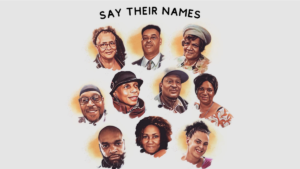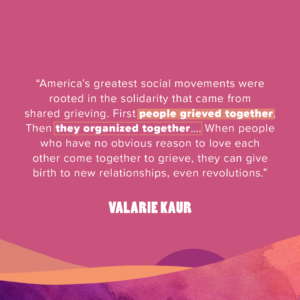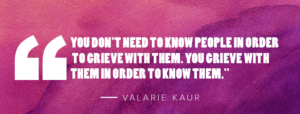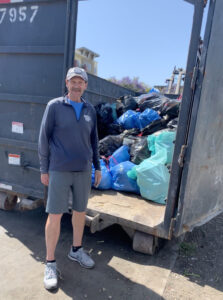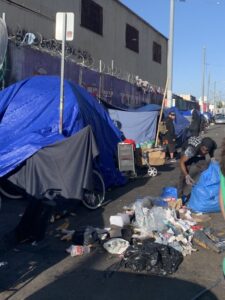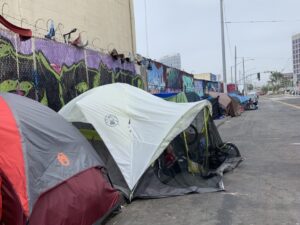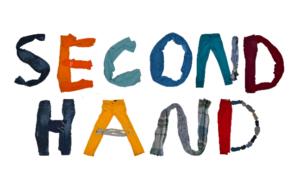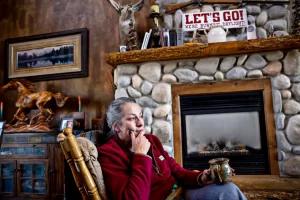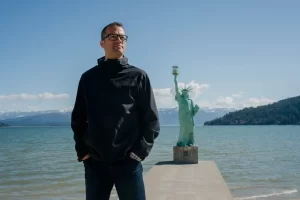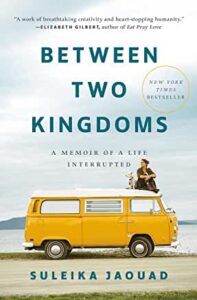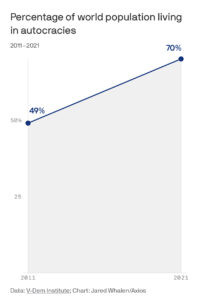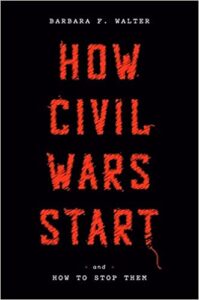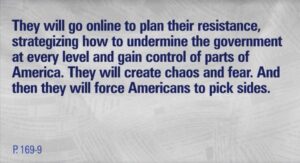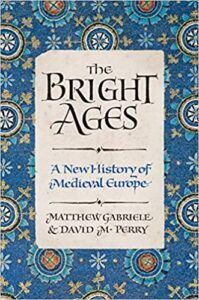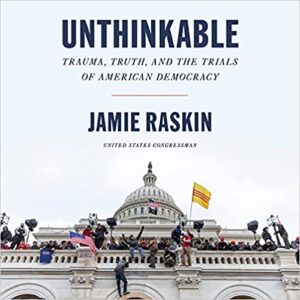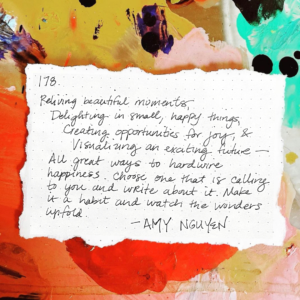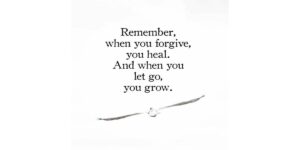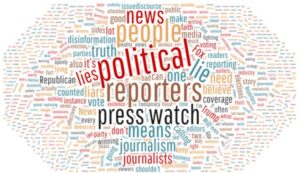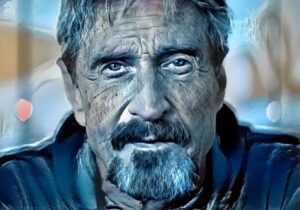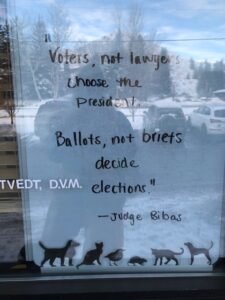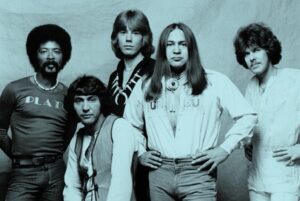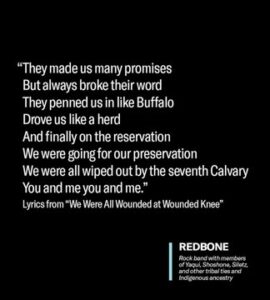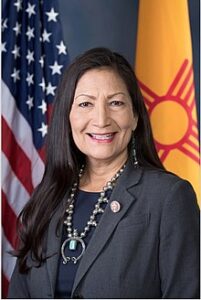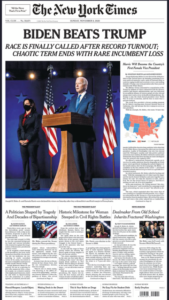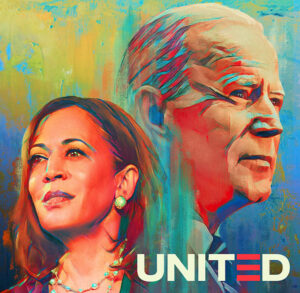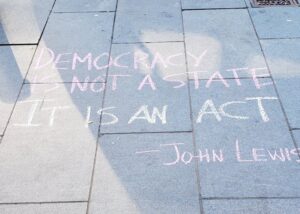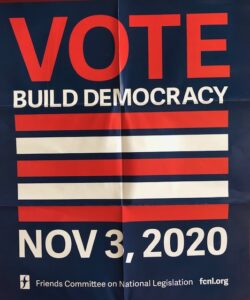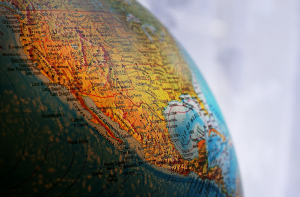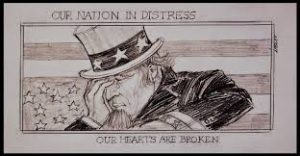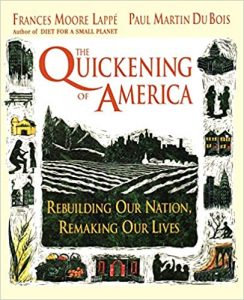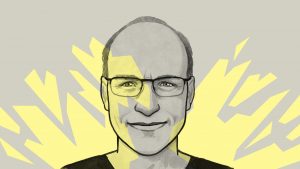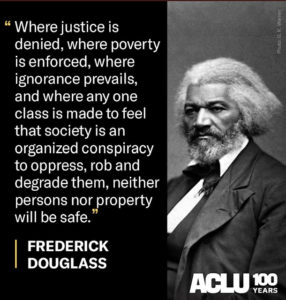Democracy
Saturday, May 21, 2022
May 21, 2022To solve humanity’s problems, we need well-functioning brains…eating and living well with kindness and awareness…always compassion…building our brain architecture.
Tending body is tending to the self, and tending to the self is tending community, tending community is tending country.
[On Being]
J
O
Y
“The joy of life is to put out one’s power in some natural and useful or harmless way.”
-Oliver Wendell Holmes
Valerie Kaur
Oh my loves.
“They’re going to keep killing us.” This was my first thought after the news broke about the shooting at a grocery store in Buffalo. Terror and fatigue.
I’ve organized around white supremacist hate for 21 years, since before this gunman was born. The killings have become more frequent, more effective, and more efficient at taking life. I got the news while working on a memorial video on the white supremacist mass shooting in Oak Creek 10 years ago, revisiting all that pain. How to feel fresh grief when we are already in grief? How does the heart expand, instead of shut down?
Revolutionary love is the choice to labor for others, opponents, and ourselves. What is your role right now?
Will you focus on others? Grieve with Black people, show up to local vigils and gatherings, listen to the stories, fight for anti-racist policies, build new relationships of solidarity. Do one thing in your sphere of influence — your school, workplace, house of worship, or home — to stand in love.
Will you focus on opponents? The gunman cited “replacement theory” in his manifesto, a theory that nearly one in three Americans believe. Reach out to the colleagues, neighbors, relatives in your life who subscribe to this dangerous and racist belief. Open a channel for deep listening, share stories, stop the spread of misinformation.
Will you focus on your body and your people? If you can feel how this shooting touches trauma in yourself and in people you love, this is the time to make space for healing. Grieve and rage, wail and scream, rest and breathe. Be with people who make you feel safe. Let in softness and love into the places that ache. Together, we survive this. {And what is yet inevitably to come. -dayle}
[1,000,000 + have died from COVID. 1 in 3 U.S. citizens believe the plague has ended. It has not.]
More from Valerie:
Where do you notice feeling grief in your body? What is the quality of that grief? What is the shape of grief inside of you? If it feels uncomfortable, take another deep breath and stay with it. Breathe through it.
What does your body need to be brave with this grief? What do you need to feel it and to move through this energy? What rituals are you called to? Who do you need by your side.
Who have you not yet grieved with? Whose story have you not fully let into your heart? What community’s struggle have you not fully taken in? Notice what is happening in your body. If your fists tighten, or your heart beats fast, or if shame rises to your face, it’s okay. Breathe through it. Trust that you can. The heart is a muscle: The more you use it, the stronger it becomes. You don’t need to know people in order to grieve with them. You grieve with them in order to know them.
What do you need to do to be able to grieve with them? What vigils or marches need you? What houses of worship are you ready to visit? What phone call are you ready to make? You can begin where you are, with a simple text or email, saying to someone “I’m here for you.”
How to be brave with your grief.
https://valariekaur.com/2022/04/how-to-be-brave-with-your-grief/
“Loving someone means that one day, there will be grieving. They will leave you, or you will leave them. The more you love, the more you grieve. And so I invite you to honor your grief: it’s a sign of how deeply you have loved.”
-Valerie
Community, then country.
Coronado Times
Meet Brian Trotier
Triangle Project, located in the East Village of San Diego, just across the bay.
“The Triangle Project is a pilot program created to help improve the lives of unhoused people. Brian has been helping out in this area for about fifteen years and has developed relationships with many of the residents. A huge issue has been the trash in the area. The residents, mainly living in tents, don’t have a place to dispose of their trash which is unsightly, unsanitary, and demoralizing for them. Richard Aaron Horton, 64, a longtime resident, started improving the area by picking up trash. Brian Trotier knows Richard well and has expanded the effort by securing funding from the Lucky Duck Foundation. This local foundation focuses on the homeless and has contracted with EDCO for a dumpster to collect the trash.
The concept is simple, and the results so far have been amazing. Brian reported that, as of last week, the Triangle Project had collected in the previous 20 days, 3,794 bags of trash weighing a total of 23.89 tons. It is likely that much of this, including plastic, would have found its way into our bay and ocean. Here is how it works: every Monday and Thursday, EDCO drops off a dumpster at 8 am. Brian brings bags, gloves, and a stack of cash. Volunteers walk around the area greeting residents and asking if they’d like trash bags. For almost all, the answer is an enthusiastic “yes!” Residents get to work cleaning up their neighborhood. For every full bag of trash they bring to the dumpster, Brian gives them $2. The roughly two-block area goes from being very littered to being very clean within an hour.”
“riangle Project’s results are about double what Brian and Lucky Duck projected, and the benefits have gone far beyond a cleaner neighborhood (and bay). Residents express appreciation for being seen; they get along better with each other. “They have a common enemy—trash,” Brian acknowledged.”
“Keeping the Earth clean. That’s what’s happening in the long run. It’s a domino effect.”
https://coronadotimes.com/news/2022/05/18/meet-emerald-keeper-of-the-month-brian-trotier/
The Independent
My Carbon Footprint: the rise of the nearly new
by, Kate Hughes
“So often, being more eco is inaccurately pinned to greater cost, when actually – especially when it comes to everyday buying decisions – the opposite is true.
This widespread, if subtle shift in the way we shop, including the disintegration of the stigma around nearly new, vintage, and preloved may well have some relationship with the climate crisis but make no mistake, this is largely financially led.
What I love about second-hand too, is that it doesn’t preclude us from layering up further planet and cash-saving approaches.
When the old boy on our street moved into a retirement flat the neighbours bought his lawnmower off him. There’s now one lawnmower between five households, saving space, cash and helping maintain and develop lines of local communication and a sense of community.
More than four in 10 of us gave goods away for free locally in the first few months of the year, while half donated products to charity and more than a third even made financial donations despite experiencing hardship.
Free stuff – everything from haircuts to sofas are also on the rise, the site reports.
So go forth and embrace the charity shop, the quirky apps, the leviathan websites.”
HuffPost
Living With The Far-Right Insurgency In Idaho
A radical GOP faction, in open alliance with extremists, is seizing power and targeting its opponents with cruelty.
Some wonder: Is it time to leave? (Yes. It is.)
Jennifer Ellis, photographed in her home on April 3, 2022, created Take Back Idaho to push back against the right-wing, extremist views and tactics that have dominated the state’s politics.
‘A lot has been written about both the radicalization of the Republican Party and the decline of democracy in the U.S. — about the country being at a precipice. It’s maybe easy for those warnings to become background noise, or to dismiss them as doom-mongering pieces of clickbait. But in Idaho, the nightmare scenario is crossing into reality, as an authoritarian GOP sets about to create a whiter, Christian nation.
These MAGA radicals have gestured at the future they want: no rape and incest exceptions to Idaho’s abortion ban; no emergency contraception; no gender-affirming health care for minors; the banning of books; the jailing of librarians; and maybe no public education altogether.
I recently spent a week traveling across the state, from Sandpoint in the northern panhandle down through the green slopes and whitewater of Hell’s Canyon to the plains of Ada County, and then across lava rock and sagebrush to Blackfoot. In all these places, Democrats and more moderate Republicans view Tuesday’s primaries as an existential affair. Some are considering leaving the state if MAGA extremists consolidate more power. Others are digging in their heels.
The people I talked to were not all that accustomed to alarmism, which made it striking to hear some of their voices tremble when they talked about what’s happening to their home. Their message for the rest of the country? It’s gonna get bad. The GOP really will go that far.
“They have completely rebranded what it is to be a conservative here in north Idaho, and they have literally excommunicated and cleaned house of any rational, regular conservative from their ranks.”
– Shawn Keenan, local Democratic activist
“As much as I want to point to examples of their adverse impact on the legislative process — and there’s many things to point to — part of me, the social scientist in me, the military veteran in me, wants to, you know, not just hate the player, but hate the game,” said Mathias, who served in the Coast Guard and has a Ph.D. in public policy.
A grading system like the Freedom Index makes the often inscrutable process of legislating more accessible to voters, Mathias said, and the IFF is an outrageous arbiter.
Mathias is intimately familiar with the group. Last spring, he watched state Rep. Ron Nate (FI Score: 97%) and other far-right legislators manufacture a racist moral panic about Boise State University indoctrinating students with “critical race theory.” (It was not.) Nate, using talking points lifted from an IFF white paper, argued for cutting part of the school’s budget.
Mathias says he typically likes to “keep his powder dry” in the statehouse — Democrats are such a minority there, it’s not worth the fuss to debate every proposal — but in this case, both as the only Black man in the legislature and as a Boise State alumni, he felt compelled to speak.
Going to Boise State on the GI Bill, he told his colleagues in a speech on the House floor, pausing to fight back his emotions, “provided opportunities I’d never seen in my life. It changed my life.”
Critical race theory, he continued, simply recognizes that there are institutional biases — in “housing, health, education, wealth, income,” Mathias said — that have existed since our country was founded. “People of color always come out on the losing end,” he added, his voice breaking. “Always. And I don’t think it’s unfair to acknowledge it.”
Across Idaho, the far right has laid siege to nonpartisan positions, some of which require specific expertise, and made them partisan, installing loyalists with sometimes disastrous results.
A recent Vanity Fair piece, for example, profiled members of the national neoreactionary movement, acolytes of a philosopher named Curtis Yarvin, who is a close ally of billionaire Peter Thiel. This movement, which has buy-in from powerful GOP figures, is explicit about wanting to usher in the end of democracy by purging the current government of its enemies and establishing one-party control — or, put another way, authoritarianism.
J.D. Vance — the venture capitalist and “Hillbilly Elegy” author who recently won the Ohio Republican primary for U.S. Senate — is a follower of Yarvin’s. He positively likened this prospective purge to the deadly “de-Baathification of Iraq.”
“I think Trump is going to run again in 2024,” Vance told Vanity Fair. “I think that what Trump should do, if I was giving him one piece of advice: Fire every single mid-level bureaucrat, every civil servant in the administrative state, replace them with our people.”
Vance and Trump might look to north Idaho for inspiration.
“We’re losing here. We’re losing our state. We’re losing our town. … It’s just becoming overwhelming.”
– Sandpoint Mayor Shelby Rognstad
Full report:
https://www.huffpost.com/entry/far-right-idaho_n_628277e2e4b0c84db7282bd6/amp
Democracy dies in darkness.
May 1, 2022Finally, a publication digging deep and giving light to the social and cultural cancer that is Rupert Murdoch’s FOX news and specifically to the hate and darkness that is Tucker Carlson. This is the first of three parts, available to all, that is, not blocked by a pay wall.
Please read and discover how a man who inherited his father’s broadcast talent only to turn his platform into a vehicle for hate and meanness to weaken, perhaps destroy, the fabric of our democracy, “you vs. them”…distrust of other…night after night, reaching three million views each broadcast, with his poisoned tentacles of disinformation, lies, and clouded deceit reaching across platforms and computers. Ideology? Maybe. More likely because he found a message that gave him the opportunity he wanted, to make money, millions. This is what he always wanted to have, especially after being abandoned by his mother, who “didn’t like him.” He allowed this personal darkness to shape his destiny, and ours. -dayle
How Tucker Carlson Stoked White Fear to Conquer Cable
April 30, 2022
American Nationalist: part 1
Reporting was contributed by Larry Buchanan, Weiyi Cai, Ben Decker, Barbara Harvey, Candice Reed, Michael D. Shear and Karen Yourish. Julie Tate contributed research. Nicholas Confessore is a New York-based political and investigative reporter and a staff writer at the Times Magazine, covering the intersection of wealth, power and influence in Washington and beyond. He joined The Times in 2004.
https://www.nytimes.com/2022/04/30/us/tucker-carlson-fox-news.html?smid=url-share
Often think back to this this post on Twitter from an encounter with Carlson at a fly fishing shop in Montana; it brings hope there are, could be, so many more democratic citizens in this country who feel, who know, the same. -dayle
“You are the worst human being known to man.”
https://www.youtube.com/watch?v=4772nP1GrTQ
—
“Moneyball” for television: a data-driven, audience-first approach to deciding what to cover and how to cover it.
Lachlan Murdoch — sole heir to the throne. He’s widely viewed as having more conservative politics than his father.’
Trevor Noah at the White House Correspondence Dinner, April 30th, 2022:
“What we’re here for is to honor and celebrate the 4th Estate…and what you stand for…what you stand for…an additional check and balance that holds power to account and gives voice to those who otherwise wouldn’t have one.”
[Pick up his closing remarks at 22:45.]
[Image: CNN]
Thursday, March 31, 2022
March 31, 2022’60-65% of all the cells in the heart are neural cells, which function in the same way as brain cells.’
A global shift is under way and more people are sensing it involves a deeper connection with their heart. This desire for more heart connection is a growing movement, one that people are drawn to by a nudge from their own intuition or conscience to listen to their heart more and to connect with their inner guidance. -Heart Math
100 Days of Creativity with Suleika Jaouad begins tomorrow, April 1st
‘Here, as I’m undergoing my second bout of cancer treatment for leukemia, I’ve decided to do a 100-day creativity project beginning on April 1, 2022, and I’m inviting all you beautiful souls to join me.
This is my fourth go-round. To me, the 100-day project is so powerful, both the sense of creative possibility and the organizing principle it affords: your day becomes centered around one small creative act. I also love the element of community, drawing inspiration and a sense of accountability from others.
There are so many shapes such a project can take—from writing a daily childhood memory to collaging, piano playing, or walking in nature. It just needs to feel exciting, a little challenging, but most of all sustainable, so you’re able to keep it up over the course of 100 days.
As someone who feels pulled by the siren call of hyper-productivity, I want to make clear: the 100-day project is not that. The point is to get into a more liberated, playful creative flow state—not to reinforce the pressure of constant striving, or the compulsion to be productive, or the idea that creative activity needs to culminate in some kind of grand masterpiece.
This time around, the 100-day project will be mostly self-directed. For those who want an extra dose of accountability, paid subscribers will have the option of getting regular pep talks from me, along with check-ins and opportunities to have your work featured.
Below you’ll find some frequently asked questions and my answers—all with the caveat that this practice is for you. Make it your own. Let it take you where it will.
In love and creative solidarity,
Suleika’
Her book, Lost Between Two Kingdoms, is now available in paperback. Wonderful read and journey. -dayle
AXIOS
Democracy is good for your health
Here’s a big reason to study the people of Ukraine: The war is showing in real-time the power of democracy, amid growing global clout for dictators.
Why it matters: Free people live better lives, a mountain of data shows. And sometimes it takes an aspiring democracy to remind us why governments of the people are worth fighting for.
Let the graphic above sink in — then share it with people who trivialize democratic erosion. Democracies are literally disappearing.
Of 195 nations on earth, just 34 are liberal democracies — where citizens have rights to free speech, free press, free and fair elections, and other liberties — according to a study by Varieties of Democracy.
Living in a stable democracy leads to a longer and more fulfilling life, the data shows:
Health: If you live in a democracy that’s at least 25 years old, you’re likely to live 14 years longer than people in autocracies, a University of British Columbia study found. Babies in mature democracies are 78% less likely to die in childbirth.
Wealth: Democratization boosts a nation’s wealth 20% over 25 years.
Education: Democratization bumps citizens’ enrollment in secondary education by 70%.
Reality check: After nuclear war, and possibly climate changes, the rise of authoritarians, like Vladimir Putin, and the decline of democracies has the most potential to shape America’s future — more profoundly than the small-ball fights we often get sucked into.
The dictators are winning. A Russian dictator, backed by an authoritarian Chinese leader and enabled by the silence of the Saudis, is killing thousands, seizing land, destroying a nation.
A Freedom House report released in February found that 60 countries had suffered declines in democracy in the previous year.
The bottom line: American critics sometimes dog — and in some cases damage — their democracy. But watching Ukrainians amplifies the preciousness and precariousness of freedom.
[Editor’s note: This article has been corrected to note that people living in democracies older than 25 years are likely to live longer.]
Glory to Ukraine ~ Their struggle, their sacrifice, is ours. -dayle
Julian of Norwich
‘She encourages us to stand up to the forces that destroy, forces she calls “the spirit of evil.”
The warrior in us can rise up, armed with trust and courage, to spread low and make justice and compassion happen. In doing this, a promise is set forth that, some day, all can be well.
“All shall be well, and all shall be well and all manner of thing shall be well.” ❁
-Julian of Norwich
‘The biggest influence on Julian as an adult were Thomas Aquinas and Meister Eckhart, whether directly or indirectly. Remember that Aquinas, who was condemned by bishops in both Oxford and Paris less than a century before Julian was born, was condemned for his non-dualism (which, again, makes him a photo-feminist). But, and this cannot be emphasized enough, he was canonized a saint in 1323, less than twenty years before she was born. The excitement among the Dominicans in England must have been extreme.
As Aquinas put it, one person can do more evil than all the other species put together.’ -Matthew Fox
Yep. Still. The 21st century is no different. -dayle
Power Path
New Moon in Aries is Friday April 1 at 12:24 AM, just after midnight March 31. In some time zones the New Moon is on March 31.
‘This is an extremely potent New Moon, full of fire, opportunity, and inspiration for starting something new. It marks the beginning of a new cycle and should be honored as the set up and foundation for new commitments, goals, confidence, clarity, change and attitude. We are called to action, to be better, to be more conscious and aligned with spirit. It’s a great time to revisit goals and intentions and either reset and confirm them as they are, or refine and improve them if they feel too limited.
A re-evaluation of your relationships especially your relationship to yourself and to spirit is also supported at this time. Are you doing the work? Are you committed to having a good life? Are you taking responsibility for it? Are you ready to embrace the power that awaits you and change all aspects of your story that point to disempowerment or being wronged in some way? This is a very good time to step into power and to do so takes being proactive and not reactive.
You cannot be ambivalent or in blame of others if you wish to be proactive and take advantage of what this time has to offer. Step into the grand adventure of life and receive the gifts of spirit that are available to those that do. Happy Spring. Happy planting of seeds, dreams and wishes.’ ☆
For the Bees
Steady-Newsletter
by Dan Rather, author and journalist
What I find so inspiring about this article and the larger No Mow May movement is its recognition that we humans are foolhardy to try to control nature — that in our homogenization of our landscapes, our search for tidiness and uniformity, we not only miss out on the beautiful wildness of Earth’s diversity, but we also do real damage to its function.
At Steady, we are always on the lookout for different kinds of news stories that inspire, provoke thought, and, yes, induce some hope and steadiness.
We came across just such an article recently in The New York Times. It was written by Anne Readel, who is described as “a photographer, writer, biologist and lawyer.” It’s quite the list of credentials and a reminder that many of us wear multiple professional and personal hats.
During an era of momentous events, this story could be considered “small” or “quaint,” but that scale of size is part of what makes it so powerful. I would argue that in a world that often seems out of balance, we can build progress from small individual actions that are transformative in their collective impact.
The article is titled, “In Wisconsin: Stowing Mowers, Pleasing Bees,” and it asks in its subtitle a question that pretty much explains its central idea: “Can the No Mow May movement help transform the traditional American lawn — a manicured carpet of grass — into something more ecologically beneficial?
‘Appleton became the first city in the United States to adopt No Mow May, with 435 homes registering to take part. For the last few years, Appleton has spearheaded the movement to save the bee by asking community members to leave their lawns alone during May.’
Lastly, on this final day of March 2022, sharing writer Alexandra Stoddard’s words of contemplation for our ‘next’ as democracies weaken, devastating wars continue, the ubiquitous plague waves in and out, and global corruption, i.e., greed, power, and patriarchy, corrodes even the simplest of lives.
When do you feel you are most in touch with your spirit, the core of your being? Where are you? What are you doing? Who are you with? Who would you want to be with? How does this make you feel?
Marianne Williamson:
“We were all indoctrinated into a disenchanted world, and we’ve sacrificed a lot in order to live here. The world isn’t better off for having forfeited its tenderness. The meanness and cynicism of our age, the reflexive sarcasm that passes for intelligent reflection, the suspicion and judgment of everyone and everything – such are toxic by-products of a disenchanted worldview.
Many of us went off that wheel of suffering. We don’t want to accept that what is is what has to be. We want to pierce the veil of illusion that separates us from a world of infinite possibility. We want another kind of life for ourselves and for the world. We are considering that there might be another way – a door to miraculous realms simply waiting to be opened. Today I consider that there might be another way.”
“What you don’t surrender, the world strips away.” -Bruce
Is now like then?
January 18, 2022Sound familiar?
“To control information is to control the world. This innovative history reveals how, across two devastating wars, Germany attempted to build a powerful communication empire―and how the Nazis manipulated the news to rise to dominance in Europe and further their global agenda.”
“Information warfare may seem like a new feature of our contemporary digital world. [And FOX media/Rupert Murdoch.] But it was just as crucial a century ago, when the great powers competed to control and expand their empires. In News from Germany, Heidi Tworek uncovers how Germans fought to regulate information at home and used the innovation of wireless technology to magnify their power abroad.”
pp. 3-4:
“In 1926, 90% of all newspapers had no correspondents abroad or in Berlin. They received all their national and international news through news agencies or syndicate services. Today, we worry about whether Facebook or Google hold monopolies over information provision. New agencies exerted an arguable even greater grasp over national and international news in the first half the 20th Century.
(Always follow the money…corporate owned media. -dayle)
p. 229:
“In the second half of the 20th century, newspaper ownership seemed like license to print money. Newspapers averaged annual returns of in the United States. Some newspapers generated profits of 30%. In comparison, grocery store profits were in the 2% range and department stores around 4%. In non-exceptional periods, when profits are hard to come by, companies become more reliant on the state or more susceptible to outside control The problem of profits has long made news firms likelier to participate in business arrangements like cartels and monopolies as well as more open to outside influences..
p. 231:
“When elites no longer believe in upholding democratic institutions, a free press alone could not stop a democracy’s disintegration. Democracy can die in full daylight, and has done before.”
[The book, 2019, has received the Fraenkel Prize from the Wiener Holocaust Library and the Ralph Gomory Prize from the Business History Conference and the Alfred P. Sloan Foundation.]
Sage Publication Journals
https://journals.sagepub.com/doi/full/10.1007/s12290-014-0315-5
[2014]
Economic Crisis and Political Extremism in Europe: From the 1930s to the Present
by, Antonis Klapas
Historical experience shows that when economic conditions remain bad for a significant period of time people tend to become more radical as far as their electoral behaviour is concerned. However, no matter how strong the linkage between economic crisis and the rise of political extremism might be, economic crisis is not the only factor to be taken into account when analysing the phenomenon of political extremism, as other parameters (historical, social and so on) are also important.
The economic crisis of the 1930s had a profound effect on European politics. The vicious circle of underdevelopment, unemployment and poverty that started in 1929 created massive social problems and thus favoured the strengthening of extremist parties, especially far-right ones (Table 1). The case of Germany was probably the most characteristic and definitely the most important one as far as its long-term consequences were concerned. Before 1929 Adolf Hitler’s National Socialist party was nothing more than a marginal political force. In the German federal elections of May 1928 they won only 2.63 % of the vote. Just two and a half years later, in September 1930 they secured 18.25 %. In the elections of July 1932 they came first with 37.27 %, a place that they managed to hold in November of the same year despite the fact that their share of the vote was reduced to 33.09 % (Gonschior 2005). On 30 January 1933 Hitler became chancellor of Germany and gradually began to impose his dictatorial and racist regime. The Weimar Republic was dead. Europe was, little by little, sliding towards the abyss of the Second World War.
The establishment of Benito Mussolini’s FASCIST regime in Italy in 1922 had already paved the way towards the dominance of political extremism. However, it was only in the 1930s that anti-democratic parties across Europe became more successful.
As in the 1930s, today most far-right extremists promise to overthrow the established political system. In general, they describe politicians (excluding themselves, of course) as corrupt and decadent. They take advantage of the mass media (with special emphasis on social media which give them the opportunity to attract the attention of younger audiences) in order to get their messages across. They make extensive use of stereotypes to address the public and they use black-and-white arguments which, despite their poor reasoning, sound reasonable to the average voter. They are conservative on societal issues and sometimes openly homophobic. They reject liberal ideas and they have racist tendencies. They underline the threat of the expansion of Islam in Europe, while at the same time some of them are anti-Semitic. They point to immigrants as one of the main causes (if not the main cause) of all sorts of problems, from unemployment to high criminality. In some cases, they do not disapprove of and talk with respect or even admiration about FASCIST and Nazi leaders of the past. There are also those who do not hesitate to resort to violence in order to intimidate others.
AXIOS
1.18.22:
Trust in governments around the world is collapsing, especially in democracies, Axios Media Trends author Sara Fischer writes from a new global survey.
- Why it matters: People don’t think government, business or the media are telling them the truth. This suspicion of societal institutions is pushing people into smaller, more insular circles of trust.
Government leaders and journalists are the least-trusted societal leaders, according to Edelman’s 2022 global “Trust Barometer,” a survey of 35,000 respondents in 28 countries.
- A majority of people globally believe journalists (67%), government leaders (66%) and business executives (63%) are “purposely trying to mislead people by saying things they know are false or gross exaggerations.”
- Around the world, people fear the media is becoming more sensational for commercial gain and that government leaders continue to exploit divisions for political gain.
[Trust in neighbors and co-workers has apparently 
[AXIOS-Sarah Fischer]
ON THE MEDIA
#MustListen
Since the insurrection on January 6, warnings of a second American Civil War have been sounded. This week, On the Media explores whether the civil war talk is an alarmist cry, or actually a sober assessment. Plus, hear how the myth of “the Dark Ages” paints an unfair portrait of medieval times.
1. David Remnick, editor of The New Yorker and host of the New Yorker Radio Hour, on the risk of second civil war. Listen.
“In the current context, is ‘Civil War’ a metaphor, a proposed diagnosis for what ails our country? Or is it meant to be taken literally? In a recent essay in The New Yorker, editor David Remnick suggests both. He writes that ‘for the first time in two hundred years, we are suspended between democracy and autocracy. And that sense of uncertainty radically heightens the likelihood of episodic bloodletting in America, and even the risk of civil war.’ Remnick tells Brooke about the value of ‘a journalism of warning,’ and why cautions of civil war should be heeded. -OTM
2. Barbara Walter [@bfwalter], professor of International Relations at the University of California, San Diego, on the tell-tale signs that a country is headed for insurgence. Listen.
“To a subset of the White population here this is deeply, deeply threatening… They see the United States as a White Christian country. And they feel like they’re justified to fight to maintain it.”
“Sadly, if we remain ignorant about how power operates in American politics, then people with nefarious purposes will step in and take it away from us. It’s why a civics curriculum in schools would create a stronger electorate and lead to greater faith & trust in the system.”
‘Everybody thought their civil war was unique,’Barbara F. Walter writes in her new book, How Civil Wars Start: And How To Stop Them. ‘So no one saw the risk factors that emerged again and again no matter where war broke out.” According to Walter, who has studied civil wars around the world for the past three decades — from Syria to Northern Ireland to Sri Lanka — the same warning signs appear each time. And now Walter says she sees those same signs here, in the United States. This week, she discusses them with Brooke.” -OTM
Anocracy or semi-democracy: a form of government that is loosely defined as part democracy and part dictatorship, or as a “regime that mixes democratic with autocratic features.” … Such regimes are particularly susceptible to outbreaks of armed conflict and unexpected or adverse changes in leadership. [wikipedia]
According to Professor Walter, a new Civil War would not look like the old one…
[Image: MSNBC]
U.S. democracy downgraded in 2016 and 2019. “U.S. no longer deemed longest consistent democracy.” It is now Switzerland.
#Anocracy
https://securesustain.org/abstract/center-for-systemic-peace/
3. Charlie Warzel [@cwarzel], journalist and contributing writer at The Atlantic, on when journalists should sound the alarm (and how loud we should ring it). Listen.
“Since the anniversary of January 6th, the pundit industrial complex has been churning out new ‘takes’ on a possible civil war every day. Could it be “like the summer of 2020, but 10 times bigger”, or ‘a Seinfeld civil war’— a war about nothing? Amid the noise, it has only become more difficult to determine the proper level of alarm. Journalist Charlie Warzel tried to help everyone calibrate in the latest installment of his newsletter for The Atlantic, Galaxy Brain. This week, Brooke and Charlie discuss the role of alarmism in the face of seemingly existential problems, and who the real ‘doomsayers’ actually are.
4. David M. Perry [@Lollardfish] and Matthew Gabriele [@prof_gabriele], authors of The Bright Ages: A New History of Medieval Europe, on how the Dark Ages might have not been so dark. Listen.
Today, when we encounter the medieval world it’s mostly a dark time. Un-enlightened by reason, but also literally gloomy – all bare stone and grey skies. We know it as a brutal time, dominated by white men with steeds and swords, or drenched in blood by marauding Vikings. But in their new book, The Bright Ages: A New History of Medieval Europe, historians Matthew Gabriele and David M. Perry trace the harm of the myths of the “Dark Ages,” and illuminate the medieval stories that have mostly escaped our modern gaze. -OTM
Boise State Public Radio
#MustListen
Excellent reporting from journalist Heath Druzin and the team at KBSX, Boise State Public Radio.
‘This podcast takes you inside the world of ascendant Patriot Movement, the militia members & far-right activists who are simultaneously preparing to fight the government & become part of it.’
https://podcasts.apple.com/us/podcast/extremely-american/id1599294971
Voices of Freedom, edited/produced by me; see if you can the identify the speakers. -dayle
Audio Player
‘Congressman Jamie Raskin has proudly represented Maryland’s 8th Congressional District in the U.S. House of Representatives since 2017. Prior to his time in Congress, Raskin was a three-term State Senator in Maryland and the Senate Majority Whip. He was also a professor of constitutional law at American University’s Washington College of Law for more than 25 years.’
[His book is #1 this week on the NYTimes hardcover non-fiction Best Seller’s List.]
“I have learned that trauma can steal everything from you that is most precious and rip joy right out of your life,” Raskin writes. “But, paradoxically, it can also make you stronger and wiser, and connect you more deeply to other people than you ever imagined by enabling you to touch their misfortunes and integrate their losses and pain with your own.”
“If a person can grow through unthinkable trauma and loss,” Raskin continues, “perhaps a nation may, too.” [NPR]
“When everything looks hopeless, you are the hope.”
-Marcus Raskin
U P D A T E
Like Germany, pre-WWII. This from Gallup, February 2022. Posted by political scientist Ian Bremmer on Twitter.
Overall quality of life:
2020: 84% 2022: 69%
System of government:
2020: 43% 2022: 30%
Economy:
2020: 68% 2022: 33%
Role in world:
2020: 43% 2022: 37%
Sunday, January 16th, 2022
January 16, 2022Marianne Williamson:
Not every lesson feels fun while it’s happening, and at times I have resisted growth fiercely. But I remain open today to the miracle of transformation. I know that as I move forward into a new realm of being, Love itself will aid me in my progress. Spirit will erase the patterns of fear that have sabotaged my past.
“Freedom without consequences is a myth.
Our actions always have consequences.
The question is: who will bear them?” -Seth Godin
From https://www.suleikajaouad.com newsletter this week.
Suleika, your name is on my alter as you continue to ease back into health. February v i b e s strong. Only love and healing and wholeness. -dayle
“When you’re suffering—enduring some kind of rage or heartbreak, disappointment or plain human idiocy—it can feel like you’re alone, like you’re the only person who’s struggling this way. Often, the impulse in those moments is not to share or create but to hide.”
-Suleika Jaouad
Diving deeply into a dynamic unity, Father Richard Rohr writes:
In the early Christian era, only some few Eastern Fathers (such as Origen of Alexandria and Maximus the Confessor) cared to notice that the Christ was clearly something older, larger, and different than Jesus himself. They mystically saw that Jesus is the union of human and divine in space and time, and the Christ is the eternal union of matter and Spirit beyond time. But the later centuries tended to lose this mystical element in favor of dualistic Christianity. We lost our foundational paradigm for connecting all opposites.
Since we could not overcome the split between the spiritual and the material within ourselves, how could we then possibly overcome it for the rest of creation?
The polluted earth, extinct and endangered species, tortured animals, nonstop wars, and constant religious conflicts have been the result. Yet Jesus the Christ has still planted within creation a cosmic hope, and we cannot help but see it in so many unexplainable and wonderful events and people.
For more and more people, union with the divine is first experienced through “the Universal Christ”—in nature, in moments of pure love, silence, inner or outer music, with animals, or a primal sense of awe.
Our encounter with the eternal Christ mystery started about 13.8 billion years ago in an event we now call the “Big Bang.” God has overflowed into visible Reality and revealed God’s self in trilobites, giant flightless birds, jellyfish, pterodactyls, and thousands of species that humans have never once seen. But God did. And that was already more than enough meaning and glory.
From journalist and former CBS news anchor Dan Rather today:
Steady is about taking the world as it comes, trying to control what you can but recognizing much is beyond your ability to shape. It is about joining with others to leverage the power of collective action. It is about caring for yourself when you need to regain your footing. It’s about understanding that others have struggled in the face of injustice and despair. Steady is about recognizing that progress is possible, even when it feels ungraspable. It is also about having the humility to understand that joy can be fleeting, so you need to find it and hold on to it when you can.
I don’t know what the next year holds in store, for me, for you, or for our country and our planet. I hope it is one of greater justice, peace, and health. I know that it will undoubtedly be one of challenges, in ways we can predict, and in ways that are unknowable.
Emerson:
God offers to every mind its choice between truth and repose. Take which you please…you can never have both. […] There is no history. There is only biography.
“Caution is like a disease, it kills ideas. Be daring. And caution will disappear.” -Yoko
Saturday, January 15th, 2022
January 15, 2022Absolute
Reciprocity
Ineffable
Perspectivism
Thinking this morning, journalism doesn’t exist, not really, not in a pure sense. Journalism is corporate owned media and social media.
Absolute?
No qualification, restriction, or limitation; not viewed ion relation to other things or factors.
Reciprocity?
Mutual benefit.
Ineffable?
Too great or extreme to be expressed.
Perspectivism?
Knowledge of a subject is inevitably partial and limited by the individual perspective.
Yes. Journalism is absolute, reciprocity exists for profit and attention, the evaporation of democracy and planet is ineffable, and all of it loaded with bias and perspectivism.
A free press is the foundation of a democracy, and in this country, the United States, as in others, it is state owned, corporate owned, billionaire owned, and not free.
We are drowning in seas of misinformation and disinformation. No one knows how to rescue our collective, or want to (?), only observing as we breathe our last breath.
Julian of Norwich:
“She took advantage of the crisis to explore more deeply what her soul and heart truly desired and was capable of.”
He knows what he’s doing.
December 13, 2021And the general media can’t seem to go deeper than beyond the flash of a few words and click-bating headlines.
Vladimir Putin.
Sends his condolences to the victims of the tornadoes in the United States. Really?
Claims he once worked as a taxi driver to overcome the hardships of the Soviet Union collapse. Think, who’s he speaking to?
As propaganda media continues to extol the virtues of Putin, he is speaking to a particular group in the United States, remolding his plan and hate for our country. He knows no bounds, and will amplify every conceivable effort to continue to divide and end what little democracy remains.
Pay attention.
Read journalism from non-corporate owned media. Follow the money, always.
#Journalism
#Authoritarianism
#Democracy
Democracy.
October 17, 2021“Democracy has never been and never been and never can be so durable as aristocracy or monarchy; but while it lasts, it is more bloody than either. […] Remember, democracy never lasts long. It soon wastes, exhausts, and murders itself.
There never was a democracy yet that did not commit suicide.
It is in vain to say that democracy is less vain, less proud, less selfish, less ambitious, or less avaricious than aristocracy or monarchy. It is not true, in fact, and nowhere appears in history.
Those passions are the same in all men, under all forms of simple government, and the unchecked, produce the same effects of fraud, violence, and cruelty.
When clear prospects are opened before vanity, pride, avarice, or ambition, for their easy gratification, it is hard for the most considerate philosophers and the most conscientious moralists to resist the temptation. Individuals have conquered themselves. Nations and large bodies of men, never.”
-John Adams
Misinformation, Lies, Political Reporting…COVID
September 29, 2021Press Watch mission statement: Political journalism needs a reset
by Dan Froomkin.
Let’s start with the overarching problem: Misinformation, disinformation and gaslighting have become rampant in our political discourse, turning citizens against each other, choking the legislative process, eroding confidence in elections, and, in the age of Covid, literally getting people killed. A striking number of voters are laboring under a series of delusions that make them incapable of rational decision-making. The country is still reeling from a violent attempted coup in the name of a Big Lie – a lie that has essentially become doctrine for one of our two major political parties.
Despite all this, our elite political media recognizes no need for a course change.
Journalists should treat a lie like a virus, for which they are the vaccine, not the spreader. The goal is to quickly fill the news space with the truth so that conspiracy theories have less place to grow.
There should be some, or else what’s the point of fact-based journalism? That means denying serial liars the opportunity to use the media – particularly live media — to spread their lies. That means whenever it’s crucial to quote a liar, warning readers and viewers of their track record. That means interrupting liars when they are repeating a lie. That means demanding retractions, publicly, prominently, and repeatedly. That means openly distinguishing between people who — totally independent of their political views — can be counted on to be acting in good faith and those who can be counted on to be acting in bad faith. Established liars should not be quoted as credible sources. (And they should certainly never be granted anonymity.)
Our very democracy is in danger. You can’t really cover politics and ignore that. It underlies everything.
Idaho Statesman
Idaho legislator urges people to get vaccinated after his mother dies from COVID-19
BY SALLY KRUTZIG
“I think there are people in our political realm who are essentially killing people with misinformation […] at what point was somebody convinced of a lie? Was it the fifth time it was repeated? Was it the 50th time? Was it the 500th time?”
https://www.idahostatesman.com/news/local/community/boise/article254599937.htm
#Idaho
John McAfee
June 23, 2021“In a democracy, power is given not taken. But it is still power. Love, compassion, caring have no use for it. But it is fuel for greed, hostility, jealousy … All power corrupts. Take care which powers you allow a democracy to wield.”
6.23.21
Dan Rather
February 11, 2021I am shaken, and I like to think I don’t shake easily.
I am moved to a deep and profound sadness, and I don’t like to think I am prone to melancholy.
But I am also emboldened and determined that what we saw today, the overwhelming evidence presented by the House Managers in the impeachment trial of Donald Trump, shall not, must not, be a portent for where this country goes. Rather it must be a wake-up call to centuries of injustice and false grievances that a would-be despot, bolstered by no shortage of confederates, weaponized and catapulted into an assault on American democracy. As I write these words I still cannot quite believe what really happened. Nevertheless, there can be no denying the reality.
I have tried to get into a rhythm for these Steady posts with a morning publishing schedule. But I feel strongly that the events of today warrant an evening edition.
January 6 was a coordinated attack. It was built atop a foundation of lies doled out with precision over days and weeks. From a different perspective, you might say this was months, years, and even generations in the making. Will it be the last gasps of a discredited white supremacy and the other forces of intolerance that weaken our nation? Will we be able to successfully fight off the lies and propaganda? Or will this be part another major strike of the sledgehammer that’s fracturing our democratic experiment?
I firmly believe that the vast majority of American citizens will see this clearly for what it is. But our voices are on the sidelines for now, other than the pressure of conscience we can bring to bear on the 100 senators who will stand in judgement. That these same women and men were also in the crosshairs of the murderous mob and that the trial is taking place at the scene of the crime, makes the events transpiring today on Capitol Hill even more surreal.
- For the senators, there can be no hiding from this historic decision… silence or procedural excuses equal complicity.
- For the rioters, there can be no leniency… terrorists are inspired by weakness.
- For the instigators, there can be no immunity… to drum up a mob hellbent on violent injustice is to encourage insurrection.
- For those in the right-wing media who aided and abetted the lies, there can be no normalizing… their role in setting the stage for the insurrection is cemented by hours of television and thousands of tweets.
- For those who have dabbled in the false equivalence framework so prevalent in Washington, this must be the end of that… there can be no comparison between the actions of the previous president and his enablers, abetters, and cheerleaders, and any “other side.” Thankfully, I think many in the press have long ago realized this and have reported accordingly.
Some might argue that this is a rush to judgement, that the president’s counsel has a right to present their case. That is indeed true. But you would have to be willfully ignorant, or cynical to the point of malevolence, to not see and hear with clarity the evidence as it stands.
I have seen my country brought low before. I have reported on the injustices and inequalities that have weakened our national purpose since its inception. I witnessed cowardice and complicity. But never before have I seen all of these undercurrents so focused in a single event.
We have clarity. We have proof. We need accountability. And we need a justice that will ring forth for the generations that follow. We cannot speak of unifying this nation without reckoning with all that is tearing it apart.
—Dan
We are still wounding.
November 18, 2020From the ACLU:
You may have heard “Come and Get Your Love,” but did you know that Redbone’s “We Were All Wounded at Wounded Knee” was banned by several radio stations in the ’70s? This Native American Heritage Month, we honor the group.

Democracy persists.
And just because I played it on the radio so many times, here’s Redbone performing on the Midnight Special in 1974. ‘Come and Get Your Love’ peaked at #5 on The Billboard Hot 100 chart and spent 18 weeks in the Top 40. It landed as the fourth-most popular song on the Hot 100 for 1974. -dayle :)
https://www.youtube.com/watch?v=U0J6vURwLSc
Debra Anne Haaland (born December 2, 1960) is an American politician serving as the U.S. Representative from New Mexico’s 1st congressional district. The district includes most of Albuquerque along with most of its suburbs. Haaland is a former leader of the Democratic Party of New Mexico. Sharice Davids and Haaland are the first two Native American women elected to the U.S. Congress. Haaland is a member of the Laguna Pueblo people. [wikipedia]
The Hill
by, Rebecca Beitsch
The Biden transition team is in the process of vetting Rep. Haaland for the Interior secretary post.
If tapped by President-elect Joe Biden, Haaland’s nomination would be historic, making her the first Native American Cabinet secretary, overseeing an agency with vast responsibility over tribal issues and public lands.
More than half of the president-elect’s transition team is comprised of women and nearly half of its members are people of color; Biden has also vowed that his new Cabinet and administration will be very diverse and “look like America.”
46.
November 8, 2020‘Character is destiny.’
[New York Times, Sunday, November 8th, 2020]
Decency.
Dignity.
Democracy.
“Now that the campaign is over—what is the people’s will? What is our mandate? I believe it is this: Americans have called on us to marshal the forces of decency and the forces of fairness. To marshal the forces of science and the forces of hope in the great battles of our time.”-President Elect Joe Biden
“America, I’m honored that you have chosen me to lead our great country.
The work ahead of us will be hard, but I promise you this: I will be a President for all Americans — whether you voted for me or not.
I will keep the faith that you have placed in me.”
Congressman John Lewis, before his passing, wrote: Democracy is not a state. It is an act.’
“America’s democracy is not guaranteed.
It is only as strong as our willingness to fight for it, to guard it and never take it for granted.
And protecting our democracy takes struggle.
It takes sacrifice. There is joy in it and there is progress.
Because ‘We The People’ have the power to build a better future.
And when our very democracy was on the ballot in this election, with the very soul of America at stake, and the world watching, you ushered in a new day for America.”
“Asian, White, Latina, and Native American women throughout our nation’s history who have paved the way for this moment tonight.
Women who fought and sacrificed so much for equality, liberty, and justice for all, including the Black women, who are too often overlooked, but so often prove that they are the backbone of our democracy.
All the women who worked to secure and protect the right to vote for over a century: 100 years ago with the 19th Amendment, 55 years ago with the Voting Rights Act, and now, in 2020, with a new generation of women in our country who cast their ballots and continued the fight for their fundamental right to vote and be heard.
Tonight, I reflect on their struggle, their determination and the strength of their vision — to see what can be unburdened by what has been — I stand on their shoulders.
[…]
But while I may be the first woman in this office, I won’t be the last.
Because every little girl watching tonight sees that this is a country of possibilities.
And to the children of our country, regardless of your gender, our country has sent you a clear message:Dream with ambition, lead with conviction, and see yourself in a way that others might not see you, simply because they’ve never seen it before.
And we will applaud you every step of the way.”
I feels so good to feel this good. -dayle
“The whole world is watching.”
We must.
September 17, 2020“…ultimately a spiritual songwriter.”
June 24, 2020THE ATLANTIC
Bruce Springsteen’s Playlist for the DT Era
“I don’t know if our democracy could stand another four years of his custodianship.”
by David Brooks
Contributing writer at The Atlantic and columnist for The New York Times.
This is a moment of tumult, anger, hope, and social change. At moments such as this, songwriters and musicians have a power to name things and help us make sense of events—artists such as Kendrick Lamar, Janelle Monáe, Tom Morello, Nina Simone, Marvin Gaye, Bob Dylan, and Bruce Springsteen.
It’s been 20 years since Springsteen wrote “American Skin (41 Shots),” a powerful song about the police killing of a black man. I thought it might be a good idea to check in with Bruce, to get his reflections on this moment and on music in this moment. Here’s a slightly edited transcript of our conversation, which took place on June 9.
“…at the heart of our racial problems is fear. Hate comes later. Fear is instantaneous. So in “American Skin,” I think what moves you is the mother’s fear for her son and the rules that she has to lay down so he can be safe. It’s simply heartbreaking to watch a young child be schooled in this way.
The Democrats haven’t really made the preservation of the middle and working class enough of a priority. And they’ve been stymied in bringing more change by the Republican Party. In the age of Roosevelt, Republicans represented business; Democrats represented labor. And when I was a kid, the first and only political question ever asked in my house was “Mom, what are we, Democrats or Republicans?” And she answered, “We are Democrats because they’re for the working people.”
Woody Guthrie- This Land Is Your Land
Citizens of a Failed State
May 28, 2020Remembering What America Might Have Been
By Jeremy Gerard
‘What has died since the coronavirus began cutting its global swath is the notion — central to our collective identity — of American exceptionalism. As George Packer writes in The Atlantic, “Every morning in the endless month of March, Americans woke up to find themselves citizens of a failed state.” The epidemic, he said, has reduced us to “a beggar nation in utter chaos.”
This phenomenon is more than the natural extension of our earlier sense that the federal government no longer functions on behalf of us all. The virus as metaphor couldn’t be more apt (sorry Susa Sontag), for it undermined the dearly held notion that the United States occupies a special, deity-endowed place in the world as a beacon to all others.
That idea of specialness, historically appropriated by religious, not political, entities, was first applied to the United States with intentional irony by Alexis de Tocqueville in the 19th century. (It was inevitably tied, as I learned in grade school, to the concept of Manifest Destiny, which to a sixth-grader explained God’s plan that white Europeans “discover” a “New World,” usurp the land, perpetrate genocide on its inhabitants, enslave peoples from an entirely different continent and lay waste its natural riches to provide goods and commodities for the Motherland.)
Credit the internet with leading us to finally understand how fragile the concept of citizenship really is, and how even leaders with good intentions are threatened by a consumerist conspiracy to turn the world into one big Amazon shopping basket. We have borne out what so impressed Tocqueville more than a century ago: Not American idealism; on the contrary, what struck him was our obsession with accumulation of wealth as the sole factor giving meaning to life.
[Jeremy Gerard is a widely published critic and reporter on culture, politics and human-rights issues. He has been a staff writer at Bloomberg News, New York magazine and the New York Times.]
The light on the hill has faded. We were never Camelot. And there is no air.
Thoughts on Democracy & Gaia
May 22, 2020Gaia
From Father Richard Rohr, Barbara Holmes, and Bill McKibbon:
Goodness is a first principle of the universe. God declares it on the first page of the story of creation. —Barbara Holmes
Creation is the first Bible, as I (and others) like to say [1], and it existed for 13.7 billion years before the second Bible was written. Natural things like animals, plants, rocks, and clouds give glory to God just by being themselves, just what God created them to be. It is only we humans who have been given the free will to choose not to be what God created us to be. Surprisingly, the environmentalist and author Bill McKibben finds hope in this unique freedom. He writes:
The most curious of all . . . lives are the human ones, because we can destroy, but also because we can decide not to destroy. The turtle does what she does, and magnificently. She can’t not do it, though, any more than the beaver can decide to take a break from building dams or the bee from making honey. But if the bird’s special gift is flight, ours is the possibility of restraint.
We’re the only creature who can decide not to do something we’re capable of doing. That’s our superpower, even if we exercise it too rarely.
So, yes, we can wreck the Earth as we’ve known it, killing vast numbers of ourselves and wiping out entire swaths of other life—in fact . . . we’re doing that right now. But we can also not do that. . . .
We have the tools (nonviolence chief among them) to allow us to stand up to the powerful and the reckless, and we have the fundamental idea of human solidarity that we could take as our guide. . . .
While the lives of our elders, our vulnerable, and essential workers are at stake during the COVID-19 pandemic, tens of millions of us across the globe have been restraining ourselves at home, choosing not to do many things for many weeks in order to protect those we love (and those others love as well). Surely the earth is breathing a sigh of relief for our reduction in pollution and fossil fuel use. This “Great Pause,” as some are calling it, gives me hope that we will soon find it within ourselves to protect our shared home, not only for our own sake, but for our neighbors across the globe, and future generations.
Democracy
How is a huge part of the world organised under a system that has different meanings country-to-country, and could even mean something different to you, and the person standing behind you in the line to vote?
How do we know democracy is broken if we don’t know what it is?
by Patrick Chalmers.
“To my mind, there seems no better starting point for understanding politics than to grapple with the word “democracy”. What does it mean and how should it work?
The word is easy enough to define. It comes from the Greek for people (demos) and power (kratos), translating as people power, or government by the people. Most of us know democracy as something like that. But things quickly get more complicated when we ask what exactly that means in everyday life.
‘…there’s ubuntu, Watch South African Anglican cleric and human rights activist Desmond Mpilo Tutu describe ubuntu in this video clip.the Nguni language word for a humanist philosophy and way of living from southern Africa. It’s most often translated as “I am, because you are”, a profoundly political concept which evokes the connectedness that exists, or should exist, between all people and the planet – a manifesto for inclusive government.’
The distorting – if not corrupting – influence of money helps to explain why elected representatives rarely reflect the societies they are meant to represent but rather their richer members. Consider the representation of women in government. Though their share of seats in legislatures worldwide is growing, they still represent fewer than a quarter of deputies. The same goes for minorities – whatever they may be, wherever they may be. So while, for example, western countries are becoming more ethnically, racially and religiously diverse, their legislators generally haven’t kept pace with these changes. If the current US presidential race is anything to go by, the face of democracy is still pale, male and stale. In parts of the world where people of colour are the majority, male and stale usually covers it.”
Rilke:
As the arrow endures the bowstring’s tension so that, released, it travels farther. For there is nowhere to remain.
Alexandra Stoddard:
Concentrate on seeing all the beauty your soul can absorb but turn away from what is ugly and vile and degrading. The higher your sights, the better your spirits. Everything we do requires us to reveal our inner longings. Identify them clearly and make productive use of them.
Thomas Merton:
There is nothing more tragic in the modern world than the misuse of power and action to which men are driven by their own Faustian misunderstandings and misapprehensions. We have more power at our disposal today that we have ever had, and yet we are the more alienated and estranged from the inner ground of meaning and love than we have ever been. -Contemplation in a World of Action, 1965
A Democratic Pledge
I would like to
- become more selective in what I watch and read
- become more critically aware of the messages I receive
- find new sources information about the things I care about most
- participate in local media
- create interactions in my community
Living Democracy is emerging within the human services, focusing not solely on individual self-reliance but also on the capacities of people to work together for mutual healing and problem solving. Society’s obligation to help support citizens with specific needs does not have to mean top-down governmental control; self-help and society’s help are mutually enhancing and mutually beneficial.
Listen.
Jacqueline Novogratz
Towards a Moral Revolution
Moral reckonings are being driven to the surface of our life together: What are politics for? What is an economy for? Jacqueline Novogratz says the simplistic ways we take up such questions — if we take them up at all — is inadequate. Novogratz is an innovator in creative, human-centered capitalism. She has described her recent book, Manifesto for a Moral Revolution, as a love letter to the next generation.
‘I think, in this moment of such peril & possibility, we really could build a world like the world has never seen before. If there was ever a decade to do it, it’s this decade. I want future generations to say, “Look how hard they tried,” not “Look at how blind they were.”’
I’m illiterate, too.
April 22, 2020My name is Patrick and I’m politically illiterate. You are too.
Talking politics often feels like a personal health hazard. Unless we can learn to understand our own roles in a dysfunctional system, there’s no chance of fixing it. Come learn with me.
“Let’s start with the term “politics”. I like the definitions of British political theorist Bernard Crick, who asserts that “politics is not merely a struggle for power among groups whose aim is to control the state”. Instead, Crick identifies three parts in politics: deciding who gets what, when and how; the exercise of power; and ensuring the welfare of whole communities.
On to “political illiteracy”. By this, in my case, I mean the flawed state of my political knowledge and the political behaviours which are its consequence. My definition of illiteracy, in other words, is not just about how I think politically; it’s about what I do and how I act in everyday life.
Example.
I was shocked. I wondered: how could world-leading “democracies” dodge the climate question at no political cost?
Too often, talking politics – whether it’s elections, or ending poverty, climate crisis, or a hundred other things besides – feels like a personal health hazard. Do you know that feeling?
In this series for The Correspondent, I will question the causes of our shared political illiteracy and explore potential remedies. Is better literacy in fact learnable? How might it transform the way we talk and do politics? That doing part will mean trying to plug the gaps in both our knowledge and our emotional skills.
On my office wall is a calligraphy that reads: “Peace in oneself, peace in the world”.
Until we can better understand how politics works, including our own parts in its dysfunction, there’s no chance fixing it. No one escapes here – not from its causes, nor its effects – though many suffer more than others.”
Patrick Chalmers is a journalist and film maker focused on making political structures truly democratic. He worked at Reuters for 11 years then wrote Fraudcast News (2012). He directs All Hands On, a short-documentary series on ordinary people doing radical democracy.
What could better look like?
February 20, 2020One thing leads to another.
-Judge J. Edward Lumbard
❦
America is not some finished work or failed project but an ongoing experiment.
If parts of the machine are broken, then the responsibility of citizens is to fix the machine, not throw it away.
Our imperfections can, and out to, draw us together in humility, realism, patience, and determination.
No one has a monopoly on wisdom or is free from error. Everyone benefits from understanding other points of view.
The foundational virtue of democracy is trust, not trust in one’s own rectitude or opinion, but rust in the capacity of collective deliberation to move us forward.
To often we define our real national challenges–climate change, immigration, health care, guns–in a way that guarantees division into warring camps.
Instead we should be asking one another: What could “better” look like?
Our Founders thought in centuries.
Abraham Lincoln warned that the greater danger to the nation came from within. All the armies of the world could not crush us, he maintained, but we could still “die by suicide.”
-James Mattis, a former secretary of defense who served for more than four decades as a Marine infantry officer.
George Washington:
“Sooner or later the chief of some prevailing faction, more able or more fortunate than his competitors, turns disposition to the purposes of his own elevation on the ruins of public liberty.”
If we want our democracy to succeed, indeed, if we want the idea of democracy to regain respect in an age when dissatisfaction with democracies is rising, we’ll need to understand the many ways in which today’s [various] platforms create conditions that may be hostile to democracy’s success. And then we’ll have to take decisive action to improve.
-Social Psychologist Jonathan Haidt and technoethicist Tobias Rose-Stockwell
